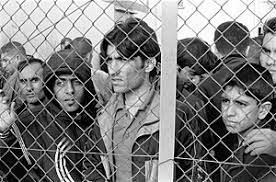
Understanding Illegal Detention and Immigration Detention
Introduction: Illegal detention and immigration detention are critical issues that demand attention in any society. These practices often involve the deprivation of an individual's liberty without lawful authority, which can lead to various human rights violations. The Crime Research Investigation Agency of India aims to shed light on these practices, examine their implications, and advocate for reforms to protect the rights and dignity of all individuals.
What is Illegal Detention? Illegal detention refers to the act of holding someone in custody without legal justification or proper authorization. It occurs when individuals are detained by law enforcement agencies, government officials, or other entities without following due process or adhering to established legal procedures. Illegal detention violates fundamental human rights, including the right to liberty and the right to a fair trial.
Common Causes of Illegal Detention:
- Arbitrary Exercise of Power: Some authorities may detain individuals arbitrarily, without any legitimate reason or legal basis, often to exert control or suppress dissent.
- Lack of Accountability: Inadequate oversight mechanisms and accountability structures within law enforcement agencies can contribute to illegal detention practices.
- Political Motivations: Individuals may be unlawfully detained for their political beliefs, affiliations, or activities, as a means of silencing opposition or maintaining power.
- Corruption: Corruption within the criminal justice system may lead to wrongful arrests and illegal detention, often for personal gain or to fulfill ulterior motives.
- Discriminatory Practices: Certain groups, such as minorities, immigrants, or marginalized communities, are disproportionately targeted for illegal detention due to prejudice or bias.
Impacts of Illegal Detention:
- Violation of Human Rights: Illegal detention infringes upon individuals' fundamental rights, including the right to freedom from arbitrary arrest and detention as enshrined in international human rights instruments.
- Psychological Trauma: Being unlawfully detained can have severe psychological consequences, including anxiety, depression, and post-traumatic stress disorder (PTSD).
- Disruption of Families and Communities: Families and communities suffer when individuals are illegally detained, leading to emotional distress, economic hardships, and social instability.
- Undermining Rule of Law: Illegal detention undermines the rule of law and erodes public trust in the criminal justice system, weakening democratic institutions and processes.
What is Immigration Detention? Immigration detention refers to the practice of detaining individuals who are suspected of violating immigration laws or regulations. It often involves the confinement of asylum seekers, refugees, undocumented migrants, and other non-citizens awaiting immigration proceedings or deportation. Immigration detention can occur in dedicated facilities, immigration detention centers, or even jails and prisons.
Key Issues in Immigration Detention:
- Lack of Due Process: Individuals in immigration detention may face barriers to accessing legal representation, fair hearings, and due process rights, compromising their ability to challenge their detention or seek asylum.
- Prolonged Detention: Some individuals languish in immigration detention for extended periods, sometimes for months or even years, leading to mental and physical health deterioration and prolonged family separation.
- Inadequate Conditions: Immigration detention facilities often suffer from overcrowding, poor sanitation, inadequate healthcare, and limited access to basic necessities, posing risks to detainees' health and well-being.
- Vulnerable Populations: Certain groups, such as children, pregnant women, elderly individuals, and individuals with disabilities, are particularly vulnerable to harm and abuse in immigration detention settings.
Conclusion: Illegal detention and immigration detention are complex issues with far-reaching implications for human rights, justice, and societal well-being. The Crime Research Investigation Agency of India is committed to researching, documenting, and addressing these practices, advocating for reforms to uphold the rule of law, protect individuals' rights, and ensure dignity and justice for all. Through collaboration with government agencies, civil society organizations, and international partners, we strive to promote accountability, transparency, and respect for human rights in detention practices.
If you have any questions, concerns, or requests please contact us at :
Crime Research Investigation Agency of India (CRIAI)
Email: 📧 info@criai.org
Contact on call ☎️ +918800304800
Send SMS 📞 +918800304800
REGISTERED OFFICE - CRIAI, 120/16 SATBARI SWARN JAYANTI VIHAR, MAHADEVAN ROAD, KANPUR NAGAR (U. P.)-208011 INDIA
Helpline No-: ☎️ +918800304800
Email : info@criai.org / criai.director@gmail.com




